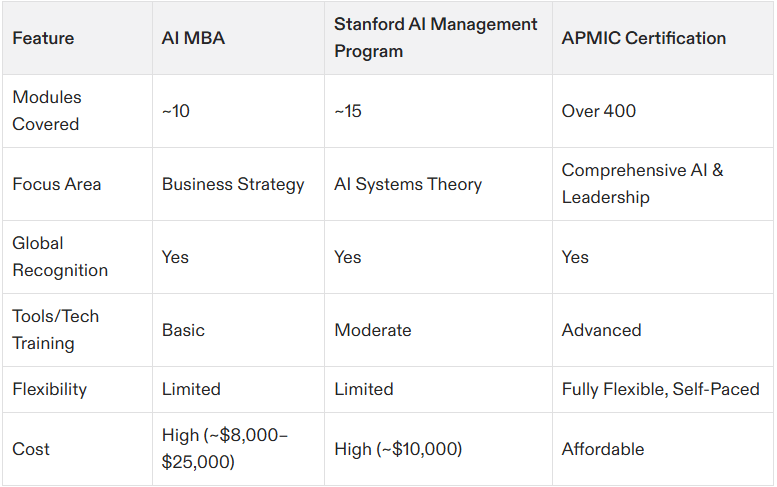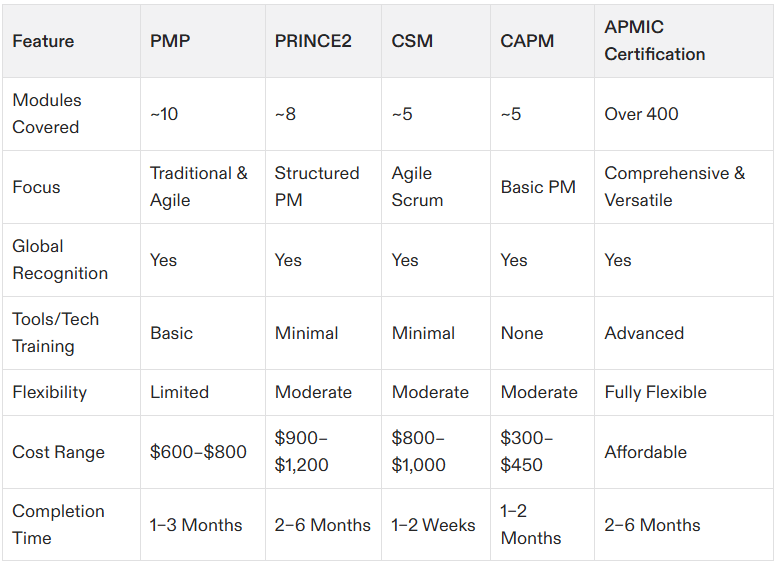Table of Contents
- What Is Waterfall Project Management?
- What Is a Waterfall Project Management Certification?
- Helpful Tips for Pursuing Waterfall Project Management Certification
- Benefits of Waterfall Project Management Certification
- Who Should Pursue Waterfall Project Management Certification?
- How to Get Certified in Waterfall Project Management
- FAQ on Waterfall Project Management Certification
- 1. What are the prerequisites for Waterfall Project Management Certification?
- 2. How long does it take to complete the certification?
- 3. How much does the certification cost?
- 4. Is online learning available?
- 5. Why should I choose APMIC over others?
- 6. Is Waterfall certification relevant in a world shifting to Agile?
- APMIC Modules Table
Waterfall project management has stood the test of time as one of the most structured and reliable methodologies for managing projects. For professionals looking to excel in this timeless approach, obtaining a Waterfall Project Management Certification is a game-changer. It boosts credibility, deepens knowledge, and opens doors to better career opportunities. This guide breaks down everything you need to know about the certification process, its benefits, and why APMIC is your best option.
What Is Waterfall Project Management?
Waterfall project management is a linear and sequential approach where each phase of a project flows systematically into the next. This model works incredibly well for projects with well-defined goals, like software development, construction, or manufacturing. Key stages include requirement gathering, design, implementation, testing, delivery, and maintenance.
For professionals managing such projects, getting certified not only demonstrates expertise but ensures processes are followed to perfection.
What Is a Waterfall Project Management Certification?
A Waterfall Project Management Certification is a globally recognized credential that validates your skills and knowledge of the methodology. Available through industry leaders like APMIC, these certifications teach you how to effectively plan, execute, and close projects using the Waterfall model.
Becoming certified means you’ve gone through a rigorous curriculum that includes project planning, risk management, resource allocation, and stakeholder communication. It's ideal for project managers, team leaders, and even senior executives handling large-scale, phase-driven projects.
Click here to explore what APMIC offers for certifications aligned to the Waterfall methodology.
Helpful Tips for Pursuing Waterfall Project Management Certification
Choose the Right Certification Body
Opt for a reputable organization like APMIC that offers comprehensive programs recognized globally. Look for features like multiple learning modes (online/self-paced), detailed curriculum, and credible assessments.Understand the Curriculum
Familiarize yourself with the syllabus to get a clear idea of what you’ll learn. Key areas include project lifecycle management, risk assessment, stakeholder communication, and tools tailored for Waterfall projects. APMIC's program with 400+ modules is an excellent benchmark.Set a Study Schedule
A structured approach is critical. Break the curriculum into manageable sections and set a realistic study timeline. If you’re working, use APMIC's flexible, self-paced options to study at your own convenience.Leverage Practice Tests
Take mock tests and quizzes to reinforce your learning. They highlight your strengths and pinpoint areas you need to improve before taking the final exam.Network With Certified Professionals
Connecting with others in the field helps you share tips, discuss challenges, and gain insights that can streamline your learning process.Highlight Certification on Your Resume
Once certified, showcase it prominently in your resume and LinkedIn profile. Highlight your expertise in using the Waterfall methodology to make your profile stand out to potential employers.Apply Knowledge in Real Projects
Make the most of your certification by implementing its teachings in real work scenarios. This ensures you don't just hold a credential but also have practical expertise to back it up.
Follow these tips, and you’ll be well on your way to becoming a certified Waterfall Project Management expert!
Benefits of Waterfall Project Management Certification
1. Enhanced Credibility
Clients and employers trust certified professionals. It assures them you have the technical and strategic skills to manage projects effectively.
2. Better Career Prospects
For project managers, this certification could be your ticket to high-profile roles and promotions. Research shows certified professionals earn up to 22% more than their peers.
3. Master Project Execution Skills
With this certification, you’ll command the ability to deliver projects that stick to timelines, budgets, and criteria.
4. Global Recognition
Certifications from respected organizations like APMIC are recognized worldwide. This gives you an edge whether you’re working locally or in an international firm.
5. Adaptability in Diverse Fields
From IT to construction, the Waterfall approach is relevant across industries. Certification makes you versatile.
6. APMIC’s Cutting-Edge Learning Modules
When you pursue the Waterfall Project Management Certification through APMIC, you gain access to an impressive library of 400+ modules designed to empower learners.
Learn more at APMIC’s official website.
Who Should Pursue Waterfall Project Management Certification?
This certification suits anyone aspiring to excel in project management roles including:
- Project Managers
- Business Analysts
- Program Managers
- IT Professionals
- Construction Engineers
- Senior Management Professionals
Whether you’re an experienced manager or a beginner, cultivating Waterfall expertise can transform your career path.
How to Get Certified in Waterfall Project Management
Step-by-Step Process
- Choose the Right Certification Body: APMIC is an industry leader offering one of the most robust Waterfall certifications.
- Enroll in the Program: Sign up for APMIC’s self-paced or instructor-led training.
- Study the Curriculum: A curriculum covering over 400+ modules ensures you are prepared for real-world scenarios.
- Pass the Examination: Successfully clear the assessment to receive your certification.
- Maintain Your Certification: Some certifications require periodic updates or continuing education to remain valid.
Key Skills You Will Develop
- Comprehensive project lifecycle management
- Analytical thinking for risk assessment
- Strong communication and leadership skills
- Mastering tools tailored for Waterfall project management
FAQ on Waterfall Project Management Certification
1. What are the prerequisites for Waterfall Project Management Certification?
Most programs, including those offered by APMIC, do not demand specific qualifications. However, prior experience in project management is beneficial.
2. How long does it take to complete the certification?
It usually takes 2-3 months for full-time learners. Flexible programs like APMIC’s allow you to progress at your own pace.
3. How much does the certification cost?
Costs vary depending on the program. APMIC offers affordable options while delivering a top-notch curriculum.
4. Is online learning available?
Yes! APMIC provides fully online modules, making it convenient for professionals to study anywhere, anytime.
5. Why should I choose APMIC over others?
APMIC provides one of the most in-depth learning experiences, spanning 400+ modules. Their focus on user-friendly learning tools and globally recognized credentials makes them a standout choice.
6. Is Waterfall certification relevant in a world shifting to Agile?
Absolutely. Certain industries and projects still favor Waterfall for its structured approach. Being certified showcases your versatility in managing both traditional and modern methodologies.
APMIC Modules Table
Waterfall project management is an essential skill, and certification is the best way to master it. With APMIC’s cutting-edge curriculum, you’ll gain expertise that not only boosts your career but helps you succeed in today’s competitive market. Don’t wait—start your learning journey today!




